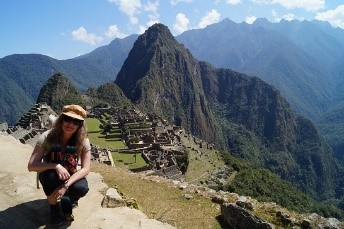
While we were all busy teaching, marking papers, setting exams, attending conferences and writing papers, Dr Raquel de Pedro Ricoy spent part of the first semester in the jungle. Literally.
Raquel is working on an AHRC-funded project entitled “Translating Cultures and the Mediation of Indigenous Rights in Peru” with Prof. Rosaleen Howard (Newcastle University) and Dr Luis Andrade (Pontificia Universidad Católica del Perú), in partnership with the Directorate for Indigenous Languages of the Ministry of Culture and the rural development agency SER. The project looks at new state-sponsored initiatives to facilitate better communication between the Spanish-speaking majority and speakers of the many Amerindian languages of the Andean highlands and the Amazon basin. The aim of the project is to research how far translation and interpreting, in contexts of mediation between the Peruvian state and its indigenous populations, can achieve the state legislated goals of upholding indigenous rights, while also sustainably developing the resource-rich territories where the indigenous populations live Ever since the Spanish conquest, Peru’s indigenous languages have lost ground to Spanish, which dominates all fields of formal communication and is seen as having greater prestige than the local Amerindian tongues. Indigenous people often suffer discrimination on linguistic as well as sociocultural grounds. However, this situation is gradually being reversed. Languages such as Quechua and Aymara in the highlands, and Asháninka and Shipibo in the rainforest, are spoken in schools and health centres, and bilingual indigenous people are becoming trained professionals in a variety of fields. Laws passed in 2011 make translation and interpretation a right, and the government is responding by translating the laws into the native languages as well as training bilingual indigenous people to be interpreters.
This is why Raquel spent two weeks in the high jungle town of Quillabamba,where the Ministry of Culture was running a training course for speakers of indigenous languages. As part of the project, Raquel and the rest of the teamobserved the training sessions, contributed to a panel on language rights and ran a workshop with the participants on the experience of translation. The trainees were speakers of: Matsigenga, an Arawak language; Harakbut a highly endangered language spoken by just 2,800 people in Madre de Dios department; and five different varieties of the Andean language Quechua. Raquel subsequently travelled to Pucallpa, in the Peruvian western jungle, where she interviewed community leaders who had used the services of interpreters in a consultation process facilitated by the Ministry of Transport and Communications. During her stay in Lima, Raquel delivered a plenary lecture at the XII International FIT Forum and joined government representatives and legal experts for a round-table discussion on legal translation and interpreting for indigenous languages.
The team is currently working on an article about the indigenous experience of translating indigenous rights law, involving translators in the difficult task of expressing western concepts such as ´rights´ and ´law´ in their own Amazonian and Andean tongues.
